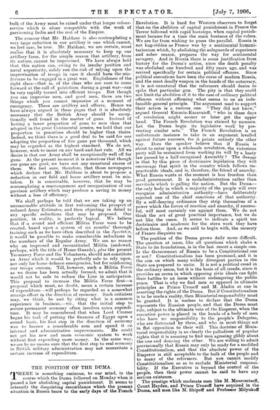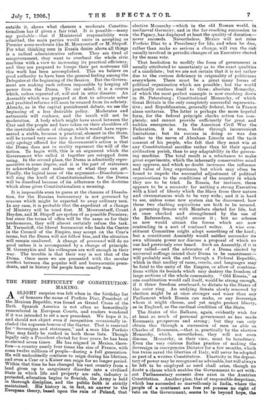THE POSITION OF TIM PUMA.
THERE is something ominous, to our mind, in the course which the Duma followed on Monday when it passed a law abolishing capital punishment. It seems to intensify the disquieting resemblance which the.2.:nnt situation in Russia bears to the • early days of the , oh Revolution. It is hard for Western observers to forget that on the abolition of capital punishment in France the Terror followed with rapid footsteps, when capital punish- ment became for a time the main business of the rulers. We are far from wishing to press the parallel. Russia is not hag-ridden as France was by a sentimental humani- tarianism which, by abolishing the safeguards of experience and sober reason, prepares the way for sentimental savagery. And in Russia there is some justification from history for the Duma's action, since the death penalty was abolished one hundred and fifty years ago, and was revived specifically for certain political offences. Since political executions have been the curse of modern Russia, and the most deadly weapon in the hands of the autocracy, it is not unnatural that the reformers should desire to spike that particular gun. The pity is that they could not limit the abolition of it to the case of ordinary political offences without affirming what seems to us an inde- fensible general principle. The argument used to support their action is a curious one. "They did not know," argued General Kuzmin-Karavaieff, "who in these days of revolution might sooner or later get the upper hand. The French Revolution was stained by excesses. Let the Puma begin its legislative work by pre- venting similar acts." The French Revolution is an unfortunate instance to take in an argument levelled against future excesses, for it points entirely the other way. Does the speaker believe that if Russia is about to enter upon a wholesale revolution, the victorious party will be restrained from working its will by a hasty law passed by a half-recognised Assembly ? The danger is that by this piece of doctrinaire legislation they will encourage that spirit in the country which follows im- practicable ideals, and is, therefore, the friend of anarchy. What Russia wants at the moment is less freedom than good government. It is maladministration rather than servitude which is galling the nation. But the Puma— the only body in which a majority of the people will ever recognise administrative authority—have deliberately rejected one of the chief sanctions of that authority. By a self-denying ordinance they strip themselves of a power which the forces of reaction and anarchy, if success- ful, will most certainly use against them. We do not think the act of great practical importance, but we do not like the omen. It seems to indicate a spirit too doctrinaire and academic for the stern work they have before them. And, as we said to begin with, the memory of France disquiets us.
The positiOn of the Puma, grows daily more difficult. The question at issue, like all questions which shake a State to its foundations, is in the last resort a simple one. Is the Government of Russia to be a Constitutional one or not? Constitutionalism has been promised, and it is the aim on which many widely divergent parties in the State are prepared to unite. It is not a political creed in the ordinary sense, but it is the basis of all creeds, since it provides an arena in which opposing civic ideals can fight their battles to an issue without endangering the public peace. That is why we find men so opposed in ultimate principles as Prince Thusoff and M. Aladin at one in asserting the rights of the Puma. But if Constitutionalism is to be made a reality, then Ministerial responsibility must be granted. It is useless to declare that the Puma represents the Russian people, and that the Puma must rule, subject to the ultimate veto of the Emperor, when the executive power is placed in the hands of a body of men who have no responsibility to the people's Delegates, who are distrusted by them, and who in most things act in flat opposition to their will. This doctrine of Minis- terial responsibility is so clearly the palladium of popular rights that it is amazing to find men agreeing glibly about the one and denying the other. We are willing to admit provisionally that Russia may only be ready for a modified Constitutionalism, and that the absolute power of the Emperor is still acceptable to the bulk of the people and to many of the reformers. But you cannot modify Constitutionalism so as to exclude Ministerial responsi- bility. If the Executive is beyond the control of the people, then their power cannot be said to have any serious existence.
The prestige which moderate men like M. Mouromtseff, Count Heyden, and Prince Drusoff have acquired in the Puma, and men like M. Shipoff and Professor Milyukoff outside it, shows what chances a moderate Constitu- tionalism has if given a fair trial. It is possible—many say probable—that if Ministerial responsibility. were admitted, the main parties would unite in accepting as Premier some moderate like M. Mouromtseff or M. Shipoff. For what thinking men in Russia desire above all things is a radical administrative reform. They are tired of misgovernment, they want to overhaul the whole civic machine with a view to increasing its practical efficiency, and they are prepared to forego their pet nostrums till this work has been accomplished. This we believe on good authority to have been the general feeling among the Delegates at the beginning of the Session. But the Govern- ment are making such reform impossible by keeping all power from the Duma. To our mind, it is a course which, unless repented of, will end in utter disaster. An Assembly which was prepared at first to advocate sober and practical reforms will soon be weaned from its sobriety. Already, as in the capital punishment debate, we see the beginning of a less desirable policy. Moderates and extremists will coalesce, and the result will not be moderation. A body which might have stood between the Czar and the people and have taken on their shoulders all the inevitable odium of change, which would have repre- sented a stable, because a practical, element in the State, will be turned very soon into a force of disruption. The only apology offered for the Government's action is that the Duma does not in reality represent the will of the nation. To begin with, this is an argument which the Government who called it together are estopped from using. In the second place, the Puma is admittedly repre- sentative in some degree, and it is the part of statesmen to acknowledge and make use of what they can get. Finally, the logical issue of the argument—Dissolution- will ring the knell of Constitutionalism, for the Duma will be dissolved because of its adherence to the doctrine which alone gives Constitutionalism a meaning.
It is impossible even to guess at the chances of Dissolu- tion, for the Russian bureaucracy is not governed by reasons which might be expected to sway ordinary men. In any case, it is probable that the expedient of a change of Ministry will be tried first. M. Mouromtseff, Count Heyden, and M. Shipoff are spoken of as possible Premiers; but since the terms of office will be the same as for their predecessors, they will almost certainly refuse the task. M. Yermoloff, the liberal bureaucrat who leads the Centre in the Council of the Empire, may accept on the Czar's terms, but the Puma will not follow him, and the situation will remain unaltered. A change of personnel will do no good unless it is accompanied by a change of principle. M. Goremykin and his colleagues are well enough in their way. The trouble is that their way is not that of the Duma. Once more we are presented with th3 secular conflict between the popular will and bureaucratic prece- dents, and in history the people have usually won.



















































 Previous page
Previous page